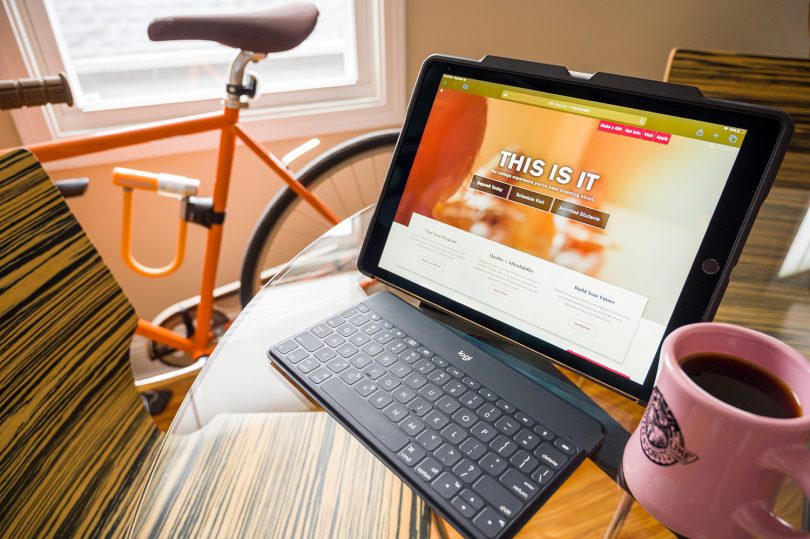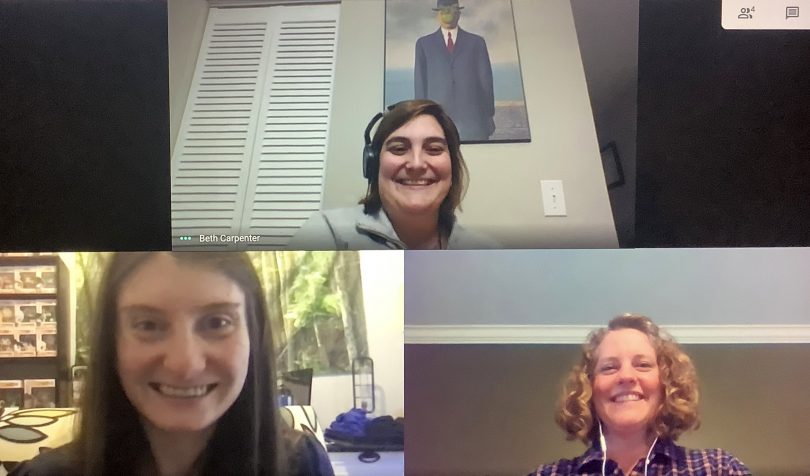
For a school that prides itself in providing students with collaborative, one-on-one relationships with faculty, the social distancing imposed by the COVID-19 pandemic can pose challenges.
Rising to the occasion, the Transylvania University community has pulled together to prepare for remote learning, which begins today and lasts through the end of the academic year. Faculty and students are benefiting from the groundwork that was put in place through the school’s Digital Liberal Arts initiative long before we were told to keep six feet from one another. And they’re getting support from staff members who’ve lately been hard at work to ensure they have the resources necessary to make the best of a difficult situation.
On the plus side, the fact that faculty make such an effort to develop close relationships with students — and the fact they’ve had a good part of winter term to do so — means the shift to distance learning will feel less isolating. “We know what each other’s needs are and can support those needs,” said Sarah Bray, a biology professor and associate dean for academic affairs. “The classes have really bonded. It will hopefully make going online less awkward.”
Faculty recently have been attending informational sessions hosted by Bray and staff who are fielding questions and creating online tutorials on different tools and links to resources.
Specifically, they’re learning how to set up Google Classrooms and more about other course management systems such as Moodle, where students can upload an assignment or check out the syllabus. They also may need pointers on things such as recording lectures or creating audio transcripts. “Just through sheer necessity, some of our faculty who may have been technology resistant are learning it’s easier than they thought,” said Beth Carpenter, user services and instruction librarian.
Their embracing of technology has gone from being a good idea to something that must be done.
It helps that through the Digital Liberal Arts initiative, faculty had already been integrating technology into their classrooms, through, for example, video projects or using high-tech Mondopads in place of traditional whiteboards and markers.
“We’re preparing faculty to open up to broader horizons when it comes to utilizing different technologies inside and outside of their classrooms,” said Nikita Lewis, digital content and technology integration specialist. Lewis had been organizing Tech Tuesdays, where various speakers talk to faculty about integrating cutting-edge tools into their courses.
To help get ready for today’s remote learning kickoff, Lewis said, “We’re answering a lot of questions, answering a lot of emails.” This support includes helping faculty find the best ways to offer what they had originally planned on their syllabuses without having to alter them too much. “We are not asking them to recreate their class and create an online course, but we’re just trying really hard to help get faculty up to speed on different aspects of say, Moodle and Google Classroom, to make sure they’re well prepared.”
Additionally, library staff are helping faculty and students find e-books and scanning parts of physical books for those who can’t make it to campus. They’ve also been loaning Chromebooks to students who need computer access.

To address another accessibility issue, professors are encouraged to make accommodations for students without high-speed internet access at home — e.g., recording a lecture for those who can’t log on to a live video chat. And the university is providing them with access to campus Wi-Fi if they need it.
Looking toward the future, Lewis said staff are keeping a running list of questions and finding out what technologies faculty are most interested in and what to promote when this is over, Lewis said. “I definitely think it will open our eyes to the whole world of technology that could add beneficial aspects to our classrooms when we’re back face-to-face.” An example would be if student-athletes couldn’t make it into class because they’re playing a road game, they could hop on a videoconferencing app to join a lecture.
In the meantime, here’s some advice from Public Services Librarian Helen Bischoff, who along with Bray, Carpenter and Lewis has taken the lead in prepping campus for remote learning: “One of the most important things that we mentioned is to really give yourself a lot of latitude — and everyone around you the same, because we are in a difficult time.” She reminds faculty they have a community of colleagues they can reach out to for support.
“As has always been the case with Transy faculty, they are rising to meet this challenge in creative and compassionate ways,” Bischoff said. “In our work with faculty this last week, it’s obvious their first priority is our students. They make the shift to remote teaching much easier, and we are prepared to support them and our students in any way possible. My colleagues have always been supportive in the best of times, and it comes as no surprise that the Transy community does not disappoint in the worst of times.”
Their efforts in this crisis tie into the school’s mission.
“We are critically thinking and solving these problems and adapting, which is what the liberal arts are about,” Bischoff said.

